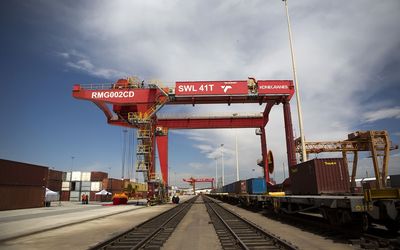SOUTH Africa recorded a staggering trade surplus of R18.7bn in May, several times higher than the expected figure of R3bn.
The new figure comes after a R127m shortfall in April — revised from a surplus of R431m.
The latest data suggest that local exports are improving, probably on a weaker rand, while imports — now more expensive because of a weaker rand — are slowing.
Exports increased 14%, or R12.8bn, while imports fell 6.6%, or R6bn.
READ THIS: Brexit seen as ‘calamitous’ for African trade with Europe
Constrained household consumption expenditure and depressed investment rates had been contributing factors to slower import growth, Investec economist Kamilla Kaplan said.
Vegetable, minerals, chemicals, precious metals and base metals exports increased in May while the imports of precious metals, machinery and equipment, and mineral products fell.
Exports for the year to date of R451.6bn were 10.2% more than the exports of R409.9bn recorded from January to May 2015.
READ THIS: SA’s trade and business interests will be first victims of Brexit
Imports for the year to date of R452.3bn were 3.4% more than the imports recorded from January to May 2015, of R437.6bn. The cumulative deficit for 2016, of R654m, is 97.6% less than the R27.6bn deficit for the comparable period in 2015.
The UK’s decision to leave the EU was expected to have an adverse effect on South African exports to the UK — particularly within the agricultural sector, Standard Bank’s head of commercial banking, Karl Götte, said.
SA imported 3.3% of total merchandise from the UK and exported about 3.8% of total merchandise to the UK, Götte said.
"Should the trade linkages with the UK react negatively on the back of the Brexit decision, this could have a negative impact on our overall current account balance."

A loading crane straddles a freight rail track at Transnet’s container handling terminal at City Deep inland port in Johannesburg. Picture: BLOOMBERG
SOUTH Africa recorded a staggering trade surplus of R18.7bn in May, several times higher than the expected figure of R3bn.
The new figure comes after a R127m shortfall in April — revised from a surplus of R431m.
The latest data suggest that local exports are improving, probably on a weaker rand, while imports — now more expensive because of a weaker rand — are slowing.
Exports increased 14%, or R12.8bn, while imports fell 6.6%, or R6bn.
READ THIS: Brexit seen as ‘calamitous’ for African trade with Europe
Constrained household consumption expenditure and depressed investment rates had been contributing factors to slower import growth, Investec economist Kamilla Kaplan said.
Vegetable, minerals, chemicals, precious metals and base metals exports increased in May while the imports of precious metals, machinery and equipment, and mineral products fell.
Exports for the year to date of R451.6bn were 10.2% more than the exports of R409.9bn recorded from January to May 2015.
READ THIS: SA’s trade and business interests will be first victims of Brexit
Imports for the year to date of R452.3bn were 3.4% more than the imports recorded from January to May 2015, of R437.6bn. The cumulative deficit for 2016, of R654m, is 97.6% less than the R27.6bn deficit for the comparable period in 2015.
The UK’s decision to leave the EU was expected to have an adverse effect on South African exports to the UK — particularly within the agricultural sector, Standard Bank’s head of commercial banking, Karl Götte, said.
SA imported 3.3% of total merchandise from the UK and exported about 3.8% of total merchandise to the UK, Götte said.
"Should the trade linkages with the UK react negatively on the back of the Brexit decision, this could have a negative impact on our overall current account balance."
























